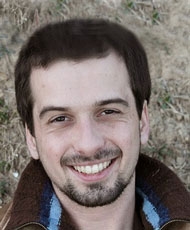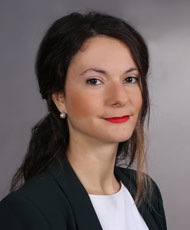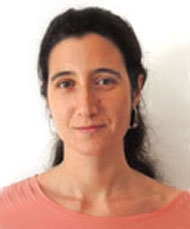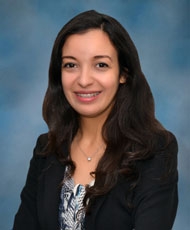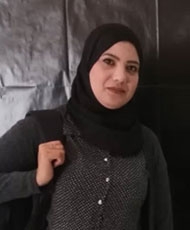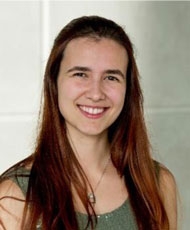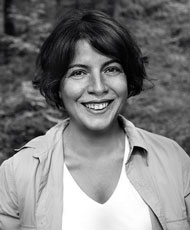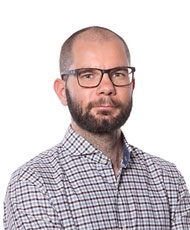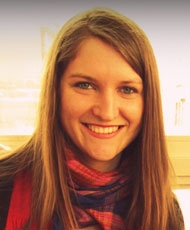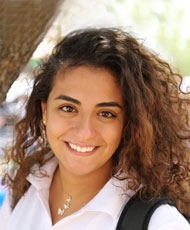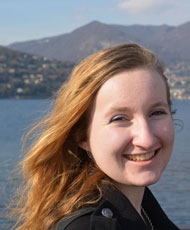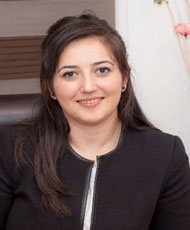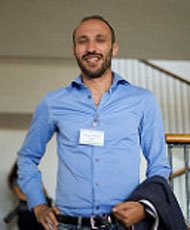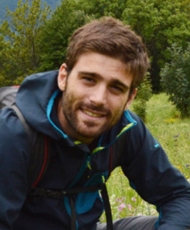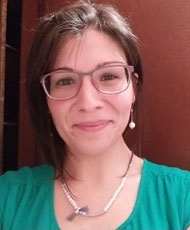|
Albert Bach studied Environmental Science and a Master’s degree in Forest Ecology at the University of Barcelona. His main research has been on Mediterranean forests’ biodiversity and values in order to promote its management. He is now developing a PhD in “Forests and Human Health: a new approach for forest management” which is part of the project “Healthy forests for a healthy society”. Albert is executive coordinator of the project which involves a team of chemists, eco-physiologist, ecologist, microbiologist and medical doctors from different disciplines. He has worked for various forest-related organisations at national and international level and has had the opportunity to work in forest biodiversity research, forests resources management, social inclusion in the forest sector and new forest values. |
|
|
Angelica Gonzalez is a forest engineer and GIS expert at the SKYLAB company. She has been working to help the forest managers improve the economic profitability of the forest in many different scenarios. This can be achieved by reducing routinary measures in forest inventories and optimising decision-making for forest management. Previously, she worked in the forest politics sector under the German forest council in Berlin, learning about current main trends and struggles for the forest political sector within Germany and Europe. In Argentina, she had the opportunity to work in pine and poplar plantations within two different sectors: Bosques del Plata, a private company in the northern region of Argentina; and then two projects with the UNLP, experiences which allowed her to contact many rural workers and understand the huge role of the forest and its rural life. |
|
|
Carmen Rodriguez has an MSc in Forest Engineering from the Universitat Politècnica de València (Spain). From 2014 to 2015 she worked with the Chair of Forest and Nature Conservation Policy of the University of Göttingen (Germany) in the international forest regime working group. In 2015, she spent four months in the Manu Biosphere Reserve (Peruvian Amazon) with the Crees Foundation, a British conservation NGO, working on agroforestry issues in the area. Currently she works for CTFC and EFI on various European Projects. She has been focusing on the political and socioeconomic aspects of NTFP, bioeconomy and social innovation issues across the Mediterranean. |
|
|
Chadlia Hachani is a second year PhD student in Biological Sciences at the Faculty of Sciences of Bizerte, University of Carthage, Tunisia and a member of the Laboratory of Forest Ecology at the National Institute of Rural Engineering, Water and Forests, Tunis. Her research interests are phytoremediation, symbiosis and plants-microorganismes interactions. Her doctoral dissertation is about the rehabilitation of an abandoned Pb-Zn mine site using ectomycorrhized and non-ectomycorrhized forest trees. The purpose of her work is to evaluate the impact of the trees - ectomycorrhiza association in the cleanup of mine sites. Parallel to her academic career, Chadlia is a member of the Junior Chamber International (JCI) of her native region of Menzel, Bizerte. |
|
|
Ibtissem Taghouti is an associate researcher in forest economics at the National Institute Agricultural Research of Tunisia, Tunis, since 2015, and member of the Laboratory of management and valorisation of forest resources of INRGREF. She received her engineer’s degree in rural economics from The High School of Agriculture Tunisia in 2011, and her PhD in forest economics from The Polytechnic University of Valencia, Spain. She has extensive research experience in the field of marketing of forest products and forest evaluation and extensive experience of working in European projects (Faster, Incredible, S3NP etc.) |
|
|
Ines Martins is Project Technician with BCSD Portugal. She has a Bachelor’s degree in Environmental Biology and is now studying for a Master’s degree in Ecology and Environmental Management at the University of Lisbon, with a thesis on “Identification of ecosystem services in business environment: a tool for Bioeconomy”. She is currently working on two H2020 projects, in communication and dissemination and providing support to volunteers in awareness raising on natural capital. |
|
| Irem Tufekcioglu is forest engineer from Turkey, graduating from Istanbul University in 2008, with one semester as an Erasmus student in Bodenkultur Universität Wien. She gained an MSc from the Silviculture Programme of Istanbul University whilst working there as a student assistant. She began a PhD in ecology in Hacettepe University in 2015, with her thesis on classification, silvicultural management and protection of maquis vegetation of Mediterranean region in the era of climate change. Previously she has worked for non-profit organisations in Turkey and as a volunteer in Greece in the context of Natura 2000. For the last four years, she has been working at Nature Conservation Centre (DKM) as Forest Conservation Programme Officer and is currently working on a project supported by the Global Environment Facility, dealing with integrating biodiversity into forest management plans in five different districts of the Mediterranean region of Turkey. | |
|
Jacopo Giacomoni studied his bachelor and master’s degree in Forest Science, at the University of Padova after growing up in a province full of mountains and magnificent natural landscapes, the reason why he decided to study forestry. As a university student, he focused mainly on forest policy and economics, with his master thesis on Payment for Ecosystem Services schemes at the University of Sydney. He has been working for a year at ETIFOR, a consultancy company in the environmental sector, in the “Responsible Management” area, which deals with economic, social, political and environmental analysis related to forest value chains, forest certification schemes and much more. He recently had the chance to work also for the Department of Land, Environment, Agriculture and Forestry of the University of Padova, in a project on the European Forest Policy. |
|
|
Jenny Gilbert has a degree in Journalism, a Masters in International Relations, Sustainability and Development and an International Diploma in Mediterranean Sustainability Studies. Jenny currently works in the Water, Environment and Blue Economy Division of the Union for the Mediterranean, supporting its regional dialogue platforms and operational activities. Previously, Jenny was Project Manager of EU-funded development projects with Latin America and Eastern Partnership countries and then Finance and Administration Officer dealing with EU-funded international higher education projects. She was a European Commission Blue Book trainee working in the Communication, Networks and Partnerships unit of European Commission Representation in London and a volunteer member of the project evaluation committee for the EU Can Aid association, which provides funding for micro-development projects in developing countries. |
|
|
Joelle Salameh is a Natural Resources Conservation Junior Specialist at the Lebanon Reforestation Initiative (LRI) since 2014. Joelle leads on the creation of the First National Forestry Park in Lebanon, that will help to develop capacities and provide a model for conservation, sustainable rural development, ecotourism activities, engagement of youth and livelihoods support. She is also a part of LRI restoration team, with work including: identifying and assessing potential reforestation sites; training planting workers on outplanting techniques; training local community members on monitoring and inspection of the planted seedlings. Joelle holds a master’s degree in Biodiversity: Management and Conservation of Natural Resources with a research study on the ecological distribution of Juniperus drupacea in Lebanon. |
|
| Juliette Amidi from Beirut, Lebanon, holds a Master of Science in Biodiversity: Management and Conservation of Natural Resources. For the past two years, she has been working at the Association for Forests, Development and Conservation (AFDC), a local environmental non-governmental organisation with a vision to achieve sustainable development and conservation of natural resources at local and national levels. She has been involved in the implementation of several projects related to nature conservation, reforestation, mapping of forests, forest management and sustainable development. She has also been involved in the development of national reports, including “Lebanon’s State of the Forest Report 2017”, the National action programme (NAP) and Land Degradation Neutrality Targets Setting (LDN) to the United Nation Convention to Combat Desertification (UNCCD), currently under review. | |
|
Laure Gosselin is a young professional in the field of environment and natural resources management. As a member of the Water, Environment and Blue Economy team at the Union for the Mediterranean, Laure liaises with Mediterranean and regional stakeholders to support UfM actions to promote an environmental agenda for the region. In particular, Laure has been conducting preliminary research for a study on measures to address land degradation, drought and desertification as drivers of migration in the Mediterranean, and has been following the labelling by the UfM of a Forest and Land Restoration project promoted by the FAO. Laure has an MA in International Relations, with a major in International Environmental Policy, and a BA in Political Sciences, both from Sciences Po Bordeaux. |
|
|
Mehtap Koç is research assistant at Istanbul University-Cerrahpaşa, Department of Forestry Economics. She gained a Bacherlor’s degree in 2007 in forest engineering and forest industry engineering and a Master's degree in forestry economics, focussing on green consumer behaviour. After working as a production-planning engineer in a furniture factory, she started her PhD in 2016. As part of the SUMFOREST project in 2017, she participated in a various training programmes for young forestry researchers. Under the title of Bioeconomy, she continues her doctoral study and works as a researcher in various projects of the General Directorate of Forestry in Turkey, with topics including: Sustainable Forest Management criteria and indicators; planning and methods for sustainable non-wood forest products; green marketing in forestry and green consumer behaviour; and current status in bioeconomics. |
|
| Mohamed Djamel Miara is lecturer-researcher at Tiaret University, Algeria, with a PhD in plant ecology. He was previously a forest engineer in the Algerian forest administration and he worked as expert for several forestry companies. As a lecturer-researcher, he has published much research in plant ecology, botany and phytosociology with a particular interest in endemic, rare and endangered plants as well as ethnobotany. | |
| Quim Canelles is an Ecologist from Barcelona. He works in landscape dynamics modelling: analysing landscape dynamics, understanding the main landscape drivers and projecting such dynamics in a global change context make landscape modelling an exciting topic that must be addressed. Furthermore, he am also interested in a broad number of other topics, such as forest and alpine ecology, botany, ecophysiology, etc. In his career as a researcher he approached terrestrial ecology from different points of view: he studied a Master's Degree in terrestrial ecology and biodiversity management at CREAF-UAB; worked in alpine ecology at IPE-SLF; and worked in plant ecophisiology at WSL. He is currently working on forest dynamics modelling at CTFC and recently started his PhD in forest dynamics modelling focused on biotic disturbances. | |
| Rita Martins is a junior researcher, with a PhD in Biochemistry, working in technology transfer at the Centro de Biotecnologia Agrícola e Agro-Alimentar do Alentejo, Portugal. Previously, Rita was a university researcher and assistant professor in Biochemistry and Biotechnology, authoring several scientific, technical and dissemination articles. She has also worked as team leader in the food industry and in promotion and sales of services, products and customer support. Rita has actively participated in the organisation of seminars, workshops and congresses for the dissemination of science, and in many competitions on science communication and innovation. As a result, Rita changed her career path from lab researcher to a science-interface player, facilitator and influencer. She now acts as liaison between researchers, companies and public authorities, transferring scientific knowledge and technologies from the lab to industrial agents, and contributing to the economic and sustainable development of society, based on science. |
